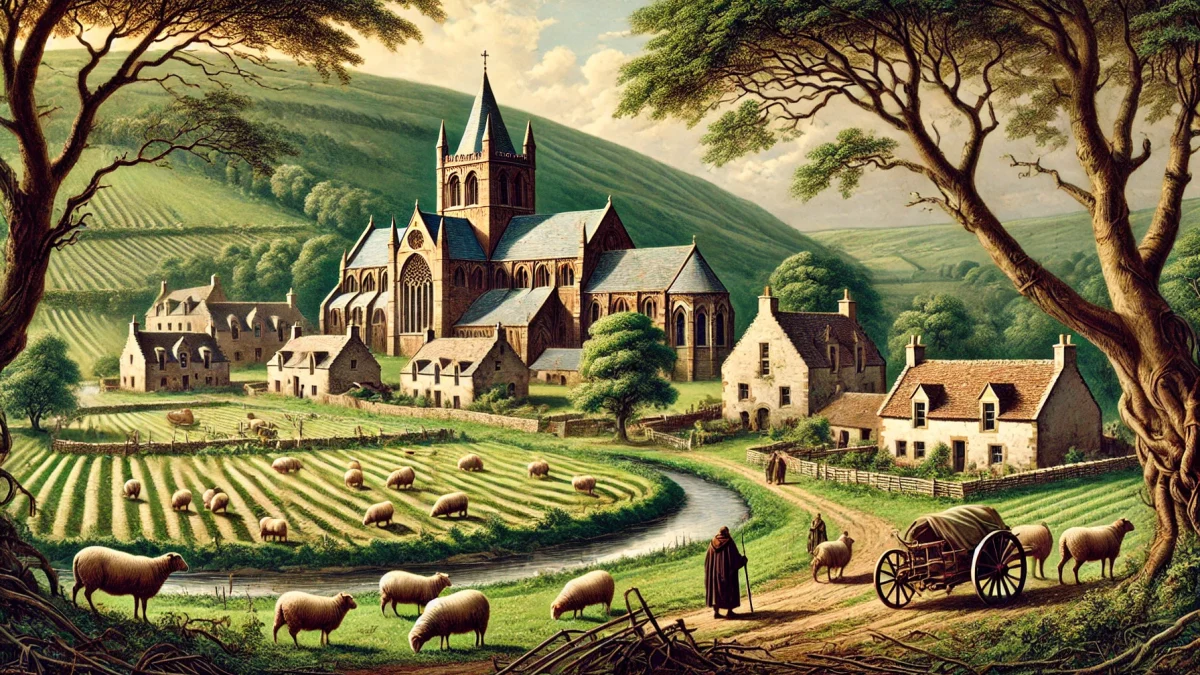The village described in the Benedictine’s manuscript by the name of Kennaquhair, bears the same Celtic termination which occurs in Traquhair, Caquhair, and other compounds. The learned Chalmers derives this word Quhair, from the winding course of a stream; a definition which coincides, in a remarkable degree, with the serpentine turns of the river Tweed near the village of which we speak.
この村は、スコットランドのデイヴィッド一世が創建した聖マリア修道院で有名です。彼の治世には、同じ郡内でメルローズ、ジェドバラ、ケルソの豪華な修道院も設立されました。これらの豊かな修道会に土地を寄進したことで、デイヴィッド王は修道士の歴史家たちから聖人と呼ばれ、またその子孫の一人からは「王冠にとって厄介な聖人だった」と皮肉を言われました。
It has been long famous for the splendid Monastery of Saint Mary, founded by David the First of Scotland, in whose reign were formed, in the same county, the no less splendid establishments of Melrose, Jedburgh, and Kelso. The donations of land with which the King endowed these wealthy fraternities procured him from the Monkish historians the epithet of Saint, and from one of his impoverished descendants the splenetic censure, “that he had been a sore saint for the Crown.”
ベネディクト派の写本でケナクウェアという名前で記されている村は、トラクウェアやカクウェアなどの複合語にも見られるケルト語の語尾を持っています。学者チャルマーズはこのクウェアという語を、川の曲がりくねった流れから由来するとしています。この定義は、村の近くを流れるトゥイード川の蛇行する様子と非常に一致しています。
It seems probable, notwithstanding, that David, who was a wise as well as a pious monarch, was not moved solely by religious motives to those great acts of munificence to the church, but annexed political views to his pious generosity. His possessions in Northumberland and Cumberland became precarious after the loss of the Battle of the Standard; and since the comparatively fertile valley of Teviot-dale was likely to become the frontier of his kingdom, it is probable he wished to secure at least a part of these valuable possessions by placing them in the hands of the monks, whose property was for a long time respected, even amidst the rage of a frontier war.
それにもかかわらず、賢明かつ敬虔な君主であったデイヴィッドが、これらの教会への大規模な寄進を宗教的な動機だけで行ったわけではなく、政治的な視点も持っていたと考えるのが妥当です。標準の戦いでの敗北後、彼のノーサンバーランドとカンバーランドの領地は不安定なものとなりました。ティヴィオットデールの比較的肥沃な谷が彼の王国の境界となる可能性が高かったため、彼はこれらの貴重な領地の少なくとも一部を、辺境の戦争の中でも長い間尊重されていた修道士の手に委ねることで確保したいと考えたのでしょう。
In this manner alone had the King some chance of ensuring protection and security to the cultivators of the soil; and, in fact, for several ages the possessions of these Abbeys were each a sort of Goshen, enjoying the calm light of peace and immunity, while the rest of the country, occupied by wild clans and marauding barons, was one dark scene of confusion, blood, and unremitted outrage.
このようにしてのみ、王は土地の耕作者に保護と安全を確保する可能性を得たのです。実際、数世代にわたり、これらの修道院の領地は一種のゴシェンとして、周囲の野蛮なクランや略奪を行うバロンたちが占める暗黒の世界の中で、平和と免税の静かな光を享受していました。
But these immunities did not continue down to the union of the crowns. Long before that period the wars betwixt England and Scotland had lost their original character of international hostilities, and had become on the part of the English, a struggle for subjugation, on that of the Scots a desperate and infuriated defence of their liberties. This introduced on both sides a degree of fury and animosity unknown to the earlier period of their history; and as religious scruples soon gave way to national hatred spurred by a love of plunder, the patrimony of the Church was no longer sacred from incursions on either side.
しかし、これらの免税は王冠の統一まで続きませんでした。そのずっと前に、イングランドとスコットランドの戦争は本来の国際的な敵対関係の性格を失い、イングランド側は征服のための闘争に、スコットランド側は自由を守るための必死で激しい防衛戦となりました。これにより、双方に以前には見られなかった激しい憎しみと敵意が生まれました。宗教的な疑念はすぐに国民的な憎しみに屈し、略奪への愛が増す中、教会の財産はもはやどちらの側からも侵入から神聖視されることはありませんでした。
Still, however, the tenants and vassals of the great Abbeys had many advantages over those of the lay barons, who were harassed by constant military duty, until they became desperate, and lost all relish for the arts of peace. The vassals of the church, on the other hand, were only liable to be called to arms on general occasions, and at other times were permitted in comparative quiet to possess their farms and feus. {Footnote: Small possessions conferred upon vassals and their heirs, held for a small quit-rent, or a moderate proportion of the produce.
それでもなお、大修道院のテナントや家臣は、絶え間ない軍事義務に悩まされ、平和の技芸への興味を失った在俗のバロンたちの家臣よりも多くの利点を持っていました。一方、教会の家臣たちは一般的な場合にのみ召集され、それ以外の時には比較的静かに農場や領地を所有することが許されていました。そのため、彼らは土地の耕作に関して優れた技術を示し、富も知識も近隣の落ち着きのない首長や貴族の軍事家臣よりも優れていました。
This was a favourite manner, by which the churchmen peopled the patrimony of their convents; and many descendants of such feuars, as they are culled, are still to be found in possession of their family inheritances in the neighbourhood of the great Monasteries of Scotland.} They of course exhibited superior skill in every thing that related to the cultivation of the soil, and were therefore both wealthier and better informed than the military retainers of the restless chiefs and nobles in their neighbourhood.
これは、修道士たちが自分たちの修道院の財産を人々に与えるために好んで用いた方法でした。そして、そうした封臣たち(このように呼ばれる)の子孫の多くは、今でもスコットランドの大修道院の近くで家族の遺産を所有しているのが見られます。もちろん、彼らは土壌の耕作に関するあらゆることにおいて優れた技術を示し、そのため近隣の落ち着きのない首長や貴族の軍事的家臣たちよりも裕福で知識も豊富でした。
The residence of these church vassals was usually in a small village or hamlet, where, for the sake of mutual aid and protection, some thirty or forty families dwelt together. This was called the Town, and the land belonging to the various families by whom the Town was inhabited, was called the Township. They usually possessed the land in common, though in various proportions, according to their several grants.
これらの教会の家臣の居住地は通常、小さな村や集落で、相互援助と保護のために30から40家族が一緒に住んでいました。これがタウンと呼ばれ、タウンに住む様々な家族が所有する土地はタウンシップと呼ばれていました。彼らは通常、土地を共有していましたが、それぞれの割り当てに応じて異なる割合で所有していました。
The part of the Township properly arable, and kept as such continually under the plough, was called in-field. Here the use of quantities of manure supplied in some degree the exhaustion of the soil, and the feuars raised tolerable oats and bear, {Footnote: Or bigg, a kind of coarse barley.} usually sowed on alternate ridges, on which the labour of the whole community was bestowed without distinction, the produce being divided after harvest, agreeably to their respective interests.
タウンシップのうち、適切に耕作され続けている部分はインフィールドと呼ばれ、ここでは大量の肥料の使用によって土壌の疲弊がある程度補われ、共同体全体の労働力が区別なく注がれ、収穫後にそれぞれの利益に応じて分配されるという形で、耐えうるオート麦や大麦が育てられました。
There was, besides, out-field land, from which it was thought possible to extract a crop now and then, after which it was abandoned to the “skiey influences,” until the exhausted powers of vegetation were restored. These out-field spots were selected by any feuar at his own choice, amongst the sheep-walks and hills which were always annexed to the Township, to serve as pasturage to the community. The trouble of cultivating these patches of out-field, and the precarious chance that the crop would pay the labour, were considered as giving a right to any feuar, who chose to undertake the adventure, to the produce which might result from it.
さらに、アウトフィールドの土地があり、そこからは時折作物を得ることができましたが、その後は土壌の力が回復するまで放置されました。アウトフィールドの区画は、タウンシップに付属する羊の放牧地や丘の中から、任意の家臣が選び取りました。アウトフィールドの区画を耕作する労力と、その作物が労力に見合うかどうかの不確定な可能性は、冒険に挑む家臣にその結果生じる産物の権利を与えました。

